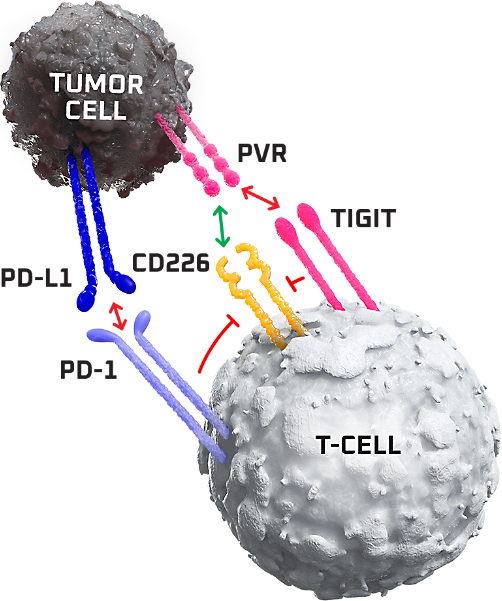TIGIT: An emerging inhibitor of antitumor response1
TIGIT is a novel co-inhibitory immune checkpoint that blocks anti tumor response. Targeting TIGIT and PD-L1 restores multiple steps in the cancer immunity cycle, offering a differentiated mechanism compared to blocking other clinically validated checkpoints, potentially leading to improved clinical outcomes1, 4
See how TIGIT works to disrupt critical cancer-immunity processes and how dual inhibition with PD-L1 may restore antitumor response.
TIGIT and PD-L1 co- blockade may lead to enhanced long- term tumor control in more patients than PD-(L)1 inhibition alone2-4
Tumor specific, long-lived cells associated with durable disease control expand to deliver an improved high quality anti-tumor immune response
The tumor microenvironment is reshaped to facilitate antitumor T cell activity
TIGIT is a co-inhibitory immune checkpoint that blocks antitumor response1,5-8


Despite monumental progress the full potential of cancer immunotherapy is yet to be realized, as sustained response and long-term survival outcomes are lacking for many patients. Novel combination approaches are needed to accelerate progress.1
Roche's scientific leadership in cancer research led to the discovery of TIGIT as a therapeutic target, with TIGIT-targeting therapies currently in clinical development across different tumor types, potentially leading to a new therapeutic option for cancer patients.11
CD226=cluster of differentiation 226; PD-1=programmed death receptor-1; PD-L1=programmed death-ligand 1; PVR=polio virus receptor; TIGIT=T-cell immunoglobulin and immunoreceptor tyrosine-based inhibitory motif domain.
References:
- Manieri NA, Chiang EY, Grogan JL. TIGIT: a key inhibitor of the cancer immunity cycle. Trends Immunol. 2017;38(1):20-28.
- Nutsch et al. TIGIT and PD-L1 co-blockade promotes functional differentiation and clonal expansion of antitumor CD8+ T cells resistant to exhaustion programming. SITC 2023, Abstract 579-B
- Nutsch et al, SITC 2023, poster: doi:10.1136/jitc-2023-SITC2023.0579-B
- Guan X et al, Anti-TIGIT antibody tiragolumab leverages myeloid cells and regulatory T cells to improve PD-L1 checkpoint blockage. Nature 2024; 1-10
- Harjunpää H, Guillerey C. TIGIT as an emerging immune checkpoint. Clin Exp Immunol. 2019;200(2):108-119.
- Ge Z, Peppelenbosch MP, Sprengers D, Kwekkeboom J. TIGIT, the next step towards successful combination immune checkpoint therapy in cancer. Front Immunol. 2021;12:699895. doi:10.3389/fimmu.2021.699895
- Rotte A, Sahasranaman S, Budha N. Targeting TIGIT for immunotherapy of cancer: update on clinical development. Biomedicines. 2021:9(9):1277. doi:10.3390/biomedicines9091277
- Chauvin JM, Zarour HM. TIGIT in cancer immunotherapy. J Immunother Cancer. 2020;8(2):e000957. doi:10.1136/jitc-2020-000957
- Pauken KE, Wherry EJ. TIGIT and CD226: tipping the balance between costimulatory and coinhibitory molecules to augment the cancer immunotherapy toolkit. Cancer Cell. 2014;26(6):785-787.
- Banta KL, Xu X, Chitre AS, et al. Mechanistic convergence of the TIGIT and PD-1 inhibitory pathways necessitates co-blockade to optimize anti-tumor CD8+ T cell responses. Immunity. 2022;55(3):512-526.e9. doi:10.1016/j.immuni.2022.02.005
- clintrials.gov

